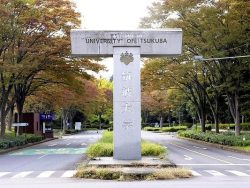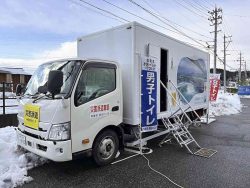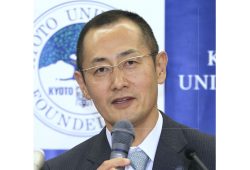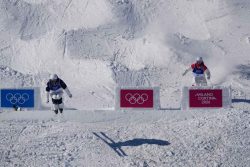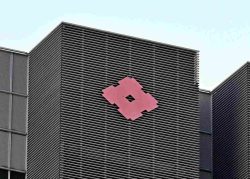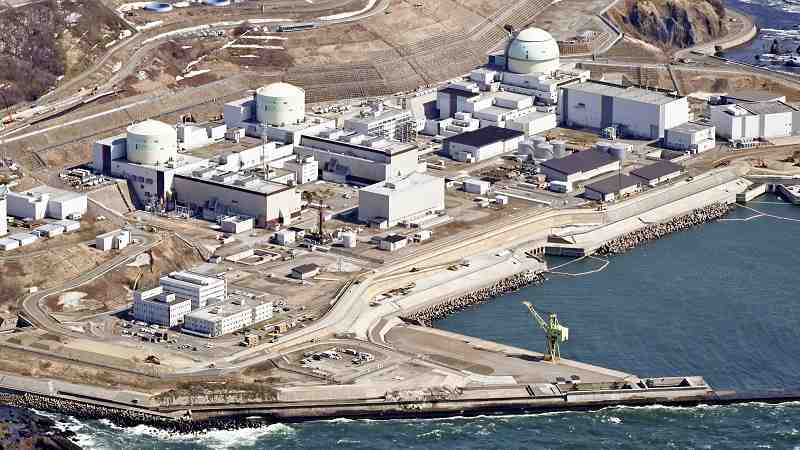
An aerial view of Hokkaido Electric Power Co.’s Tomari nuclear power plant
11:55 JST, June 1, 2022
SAPPORO (Jiji Press) — A Japanese district court Tuesday ruled against restarting operations at Hokkaido Electric Power Co.’s Tomari nuclear power plant, citing safety concerns.
Tetsuya Taniguchi, presiding judge at Sapporo District Court, issued the ruling in a suit that some 1,200 plaintiffs, including local residents, filed in November 2011 demanding a halt and decommissioning of the plant in the village of Tomari in the northernmost prefecture of Hokkaido for safety reasons.
Taniguchi ordered the power company not to operate the plant, saying that the facility “does not meet the standards for safety against tsunamis.”
On the other hand, he rejected the demand for decommissioning the plant’s three reactors with a combined output of 2 million kilowatts. All of the three remain idled.
According to the plaintiffs’ lawyers, it is the third ruling ordering a nuclear plant halt since the March 2011 triple meltdown at Tokyo Electric Power Company Holdings Inc.’s Fukushima No. 1 plant, and the first in which insufficient tsunami measures are behind the decision.
Hokkaido Electric plans to appeal the ruling.
The judge said whether nuclear plants meet safety standards established by the Nuclear Regulation Authority must be proven by the power utilities that operate them, as they have the knowledge and resources to do so.
If the operators do not fulfill that obligation, their plants may be deemed to be unsafe and in violation of nearby residents’ personal rights, he said.
Taniguchi observed that Hokkaido Electric has not backed up with sufficient evidence its claim that the seawall around the Tomari plant can protect against tsunamis and that soil on which the wall stands is unlikely to liquefy.
Since the structure of a new seawall that the company plans to build has yet to be decided, “there is no facility that can retain tsunami defense capabilities, and therefore the safety standards have not been met,” he said.
Taniguchi concluded plaintiffs’ rights are expected to be infringed in the event of a major accident triggered by a tsunami, accepting the claim of plaintiffs who live within a 30-kilometer radius of the plant and are considered to suffer health problems from radioactive substances if such an accident happens.
Regarding the fact that the lawsuit and the NRA’s screening of the Tomari plant are taking a long time, the judge said, “The inability of Hokkaido Electric to finish proving its claim even after such a long period shows how big the plant’s safety issues are.”
The company halted all three reactors for routine inspections by 2012 and applied for examinations by the nuclear industry watchdog the following year to restart them. The plant has yet to get back online as the NRA is continuing to screen it.
Meanwhile, the judge said, “It is difficult to find concrete circumstances that require” the plant’s decommissioning.
In Tokyo, Prime Minister Fumio Kishida told reporters, “There is no change to the government policy of restarting nuclear reactors whose safety has been confirmed under the NRA standards while working to obtain understanding from local residents.”
Top Articles in Society
-

Man Infected with Measles May Have Come in Contact with Many People in Tokyo, Went to Store, Restaurant Around When Symptoms Emerged
-

Woman with Measles Visited Hospital in Tokyo Multiple Times Before Being Diagnosed with Disease
-

Australian Woman Dies After Mishap on Ski Lift in Nagano Prefecture
-

Foreign Snowboarder in Serious Condition After Hanging in Midair from Chairlift in Nagano Prefecture
-

Record-Breaking Snow Cripples Public Transport in Hokkaido; 7,000 People Stay Overnight at New Chitose Airport
JN ACCESS RANKING
-

Japan Institute to Use Domestic Commercial Optical Lattice Clock to Set Japan Standard Time
-

Israeli Ambassador to Japan Speaks about Japan’s Role in the Reconstruction of Gaza
-

Man Infected with Measles May Have Come in Contact with Many People in Tokyo, Went to Store, Restaurant Around When Symptoms Emerged
-

Prudential Life Insurance Plans to Fully Compensate for Damages Caused by Fraudulent Actions Without Waiting for Third-Party Committee Review
-

Woman with Measles Visited Hospital in Tokyo Multiple Times Before Being Diagnosed with Disease



